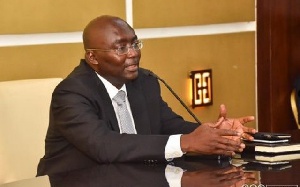 Dr Mahamudu Bawumia is Vice President of the Republic of Ghana
Dr Mahamudu Bawumia is Vice President of the Republic of Ghana
Vice President Dr Mahamudu Bawumia has dispelled criticism that government has gone for a US$19bn loan from China, insisting that it is a joint venture between the two countries.
“…We developed this new financing model… We are saying we can’t borrow, so essentially what we need was a new way forward and we sought to leverage less than 5 per cent of our bauxite to unlock close to 20 billion dollars,” Dr Bawumia said on Tuesday July 4.
“We could not ask China to give us aid to finance this quantum of investment we needed. We could not borrow this quantum of money we needed, but we knew we had bauxite sitting in the ground.”
He was speaking at a China-Africa Joint Research and Exchange Programme organised by the Institute for Democratic Governance (IDEG) on the theme: “Building Resilient Industries and Infrastructure for Economic Transformation in Africa: The Role of China”.
Dr Bawumia explained: “The goal of government is to leverage our natural resources for economic transformation.”
He revealed that Ghana has over 460 million metric tonnes of alumina, which is trading at US$ 400 per tonne, at Nyinahin and Kyebi in Ghana’s reserves, therefore if the country produces alumina the country can earn US$184million but “if you refine it into aluminium then out of those same reserves we will get US$460billion and this is only for bauxite”.
“We have immediate infrastructure needs of say between US $15 to 20 billion in areas such as rail, water, energy and so on. So we have US $460 billion potentially sitting in the ground somewhere and we need US$ 20billion for our rapid economic transformation,” he pointed out.
He continued: “So we need development partners to refine this bauxite, but we want to develop it in Ghana. That is why we want to set up a refinery in Ghana so we can refine and export.”
He added that the New Patriotic Party (NPP) government understood clearly that “Ghana’s space for borrowing was very limited or non-existent to finance this agenda because you have borrowed so much as a country and our debt-to-GDP ratio is too high, so we needed to think of a new strategy”.